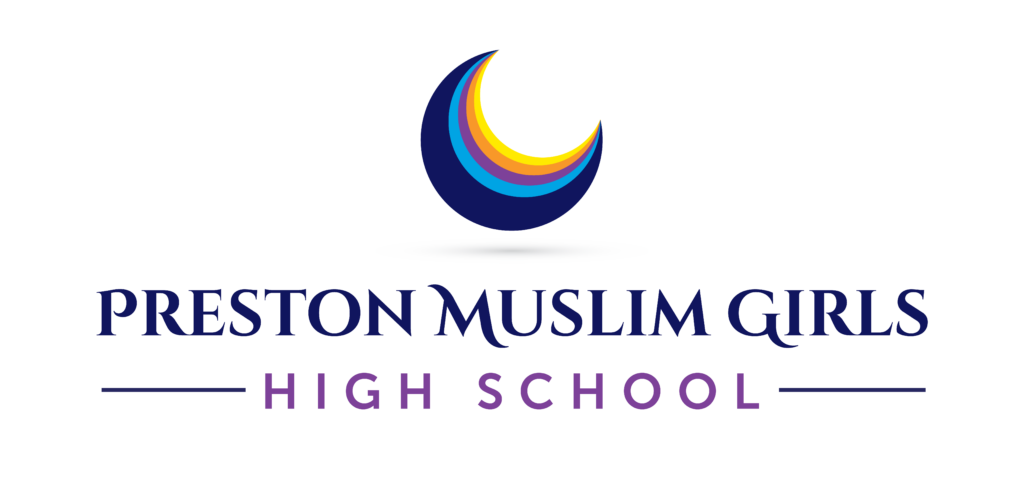Intent
At Preston Muslim Girls High School, we believe that Mathematics is a universal language and a vital tool in everyday living. It develops pupils’ abilities to calculate; to reason; to solve problems; handle data and to gain a greater understanding of the world we live in. Understandably, a great deal of emphasis is placed on the way that Mathematics is taught.
Our aims in the Maths Department reflect the aims of National Curriculum whilst also aiming to ensure a smooth transition for pupils between Key Stages and ensure progression in teaching and learning throughout their time at PMGHS. Pupils are provided with an ambitious and varied curriculum which meets the needs of every pupil by setting challenging targets with high expectations of all pupils.
The Curriculum emphasises the importance of developing essential knowledge and skills and focuses on learning and progress. Our goal is to also nurture the development of a logical and methodical mindset amongst our pupils, as well train young minds to focus and develop perseverance and problem-solving skills in any situation.
The knowledge and skills pupils develop in Mathematics is enhanced using ICT which is incorporated into teaching to further stimulate learning. Whilst some students will always enjoy mathematics, others need to gain enjoyment of the subject by building confidence and seeing their own progress. We attempt to change pupils’ attitudes and views to Mathematics by developing a growth mindset and emphasising that success in the subject is more effort than ability. Pupils are also provided with a range of enrichment opportunities such as: UKMT, National and Local Maths Competition etc, outside the curriculum to enhance understanding and enjoyment of Mathematics.
Implementation
Key Stage 3 pupils are taught 5 lessons a week, with pupils initially grouped according to ability based on KS2 Prior Data, CATS Data and a Baseline test. Subsequently pupils can move across sets based on improved performance or informed decisions by their class teachers. All year 7 and 8 pupils follow the same SOW. At present, Years 7 and 8 have a half-termly topic test to assess what they have learnt over that period. At the end of the year, pupils sit a formal cumulative assessment of content learnt over the whole year.
Year 9 is split into 2 tiers: Higher and Foundation. Both tiers follow separate SOWs. Higher Graded GCSE topics are introduced earlier in Year 9 SOW such as ‘Surds’ so that pupils are challenged and have opportunities to practise exam-style questions based on these till Year 11 through starters, class activities and assessments. All SOWs include RAG ratings within topics: Red topics – topics seen before and are to be covered by all sets, Amber – unseen topics which are to be covered by all sets and Green – Extension topics – which must be covered by certain sets and these topics may be covered by the other sets at the teacher’s discretion.
In KS4 pupils are taught 4 lessons a week, with Year 11 having an extra Maths intervention/booster session once a week after school. Year 10 and 11 pupils are assessed using exam papers once per half term, with formal mock exams for Year 11s closer to their GCSEs. Majority of the cohort are entered for the Higher Tier, pupils who are entered to sit the Foundation Tier have smaller class sizes which allows them to have greater teacher interaction and more one to one support. This in turn helps them to gain more confidence in their maths ability.
The SOWs for all year groups have been designed to follow interleaving and sequenced learnings. Topics are covered in the order: number, algebra, shape, data and ratio. This allows opportunities to recap previous topics and increase pupil retention. All lessons are differentiated with extension tasks available to accommodate and stretch pupils with teachers using various questioning techniques to gain an insight into pupils’ knowledge and understanding.
Teachers focus on helping pupils retain their declarative knowledge by using techniques such as a ‘weekly skills check’ where pupils’ knowledge of facts, formulas and mathematical concepts are tested once a week. Teaching for understanding has big importance in lessons and teachers always ensure pupils can develop procedural knowledge through modelling of answers step by step and ensuring pupils are using correct mathematical working out. Use of exam questions as starters/extension tasks and plenaries allow pupils to combine their declarative and procedural knowledge into strategies to help them reason and solve problems.
All pupils are given feedback on their learning both verbally and written. Pupils receive regular teacher feedback during individual lessons and after each assessment has been completed. Pupils are expected to make corrections using a green pen following live modelling from the teacher and they also receive a diagnostic feedback sheet which allows them to evaluate their own performance and give themselves targets for improvement.
Sharing good practise is particularly important for the department with time dedicated within faculty meetings to discuss teaching of particular topics or sharing of resources. Workload is shared out within the department with staff creating and sharing learning maps, QLA’s, diagnostic feedback sheets and homework booklets which helps to maintain consistency across all. Staff also regularly attend various local CPDs to network and develop themselves on different teaching approaches which is then shared with the department.
Impact
GCSE Mathematics results at PMGHS are above expectations with both attainment and progress above the national average. In the 2021/2022, the percentage of pupils achieving a standard pass was 90.2% and the percentage of pupils achieving a ‘strong’ pass was 62.5% which was significantly higher compared with the national average of 64.9% of students achieving a standard pass. The percentage of pupils achieving a Grade 7+ at PMGHS was 25%, which was also compared with a national average of 19.9% in 2021/2022.
Through weekly form time numeracy challenges and whole school competitions, pupils have an increased competitive spirit and are more engaged. Our pupils see that numeracy is around the whole school, and not just in their maths lessons. Form time activities have helped everyone to have a positive mindset towards numeracy and has allowed all teachers to be responsible to shift and develop students’ growth mindset.
Mathematics teaches problem-solving, an invaluable skill in the workplace. Careers involving Maths are found in almost every field including medical, scientific and research communities. Each of these careers involve use of some level of Maths on a regular basis. During all lessons across all key stages, pupils are shown career links where relevant and where maths is used in the wider world. This allows our pupils to be better equipped and more informed when moving onto the next stage of their education or work life.

